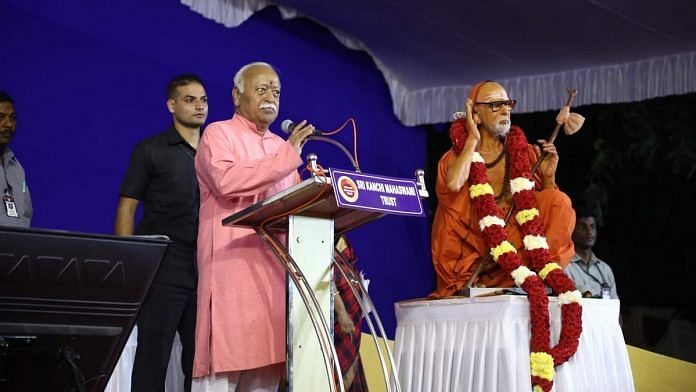New Delhi: As the nation celebrates the 150th birth anniversary year of Mahatma Gandhi, the RSS is all set to initiate another round of national debate on the Mahatma’s legacy. The RSS sarsanghchalak (chief) Mohan Bhagwat will address a select audience in Delhi on the subject “Gandhi Ko Samajhney Ka Yahi Samay (It’s time to understand Gandhi).”
The RSS chief will be delivering the keynote address on the relevance of Gandhi’s thoughts in contemporary India after releasing a book having the same title on 17 February. The event is to be held at the Gandhi Smriti in Delhi and will be presided over by former secretary general of the Lok Sabha and noted Constitutional expert, Subhash Kashyap.
Relevance of Gandhi’s Thoughts in Contemporary India has been written by well-known educationist professor J.S. Rajput who is known for introducing a ‘nationalistic’ curriculum in schools through NCERT text books.
Rajput headed the National Council of Educational Research and Training (NCERT) from 1999 to 2004 when the Atal Bihari Vajpayee-led BJP government was in power. The NCERT decides upon the curriculum of school textbooks in India. Rajput had initiated major changes in the school curriculum that had attracted criticism from the Left academics, especially historians.
Also read: Bhaiyyaji’s ‘Hindus not synonymous with BJP’ remark not new, it’s an old RSS ideology
Book delves into Gandhi’s views on education
In the 142-page book published by ‘Kitabghar’, a Delhi-based publishing house, Rajput has devoted major space to Gandhi’s thoughts on education and how the present education system is becoming dysfunctional due to moving away from Gandhi’s thoughts.
Quoting from Gandhi’s original works, Rajput draws the conclusion in one of the chapters, titled Gandhi ke Ashram (Gandhi’s Ashram), that the Mahatma believed that due to the crude replication of the foreign education system, “the source of originality has completely dried up, local languages have become poor and the common masses don’t have the opportunity to learn something new from the educated class”.
Throughout the book, Rajput actually echoes the philosophy of the RSS-backed educational organisations, which have been emphasising the need for a “Bharatiya Education System.”
For example, in another chapter titled Sadbhavna ki Shiksha (The Education of Goodwill), Rajput mentions, “It is time for a rethink on how the real spirit of ‘secularism’ has been subjugated to manipulations and hence our children have been kept away from getting knowledge of an all inclusive Bharatiya culture.
“Every Bharatiya must get introduced to the fundamentals of that culture on the basis of which ‘Diversity is Acceptable’ in our country. Only then people can live together in harmony and the nation can move ahead.”
Also read: This RSS-inspired website based in Hyderabad is selling all things Hindutva
‘RSS has always cherished Gandhi’s legacy’
According to senior RSS functionaries, the present chief and his predecessors have always cherished Gandhi’s legacy and have been trying to take it forward. But the Sangh’s detractors have tried to malign it by dragging its name into controversies related to Gandhi’s assassination.
It may be recalled that a ban was imposed on the RSS on 4 February, 1948, after Gandhi’s assassination on 30 January, 1948. The then sarsanghchalak M.S. Golwalkar was arrested by the Congress regime at the Centre. The ban was lifted on 12 July, 1949, with then Home Minister Sardar Patel being on the record saying that there was no proof of any role played by the RSS in the assassination. The detractors of the organisation, however, have been consistently trying to project it as anti-Gandhi.
The RSS functionaries cite several instances to show that the organisation is actually the true heir of Gandhi’s legacy. Gandhi was a staunch Hindu and the views of the RSS and Mahatma are the same on Hinduism, swadeshi, cow protection, untouchability and sustainable development.
According to the RSS archives, in 1934, Gandhi visited an RSS training camp at Wardha in Maharashtra. He was impressed to see that young men from all castes were staying and eating together, and that the caste identities didn’t bother the swayamsevaks.
On 16 September, 1947, while addressing a meeting in Delhi, Gandhi recalled, “I visited the RSS camp years ago when the founder, (K.B.) Hedgewar was alive. I was very much impressed by the discipline, the complete absence of untouchability and the rigorous simplicity.
“Since then, the Sangh has grown. I am convinced that any organisation that is inspired by the high ideal of service and self-sacrifice is bound to grow in strength.
A senior RSS functionary, in the context of the 17 February event, said, “We believe that it is time to highlight Mahatma’s legacy and put forth the right perspective about RSS’ viewpoint on Gandhi and what better way than the Sarsanghchalak himself speaking on Mahatma’s legacy and its relevance.”
(The writer is CEO of Indraprastha Vishwa Samvad Kendra and author of two books on the RSS).



